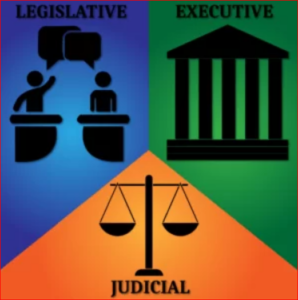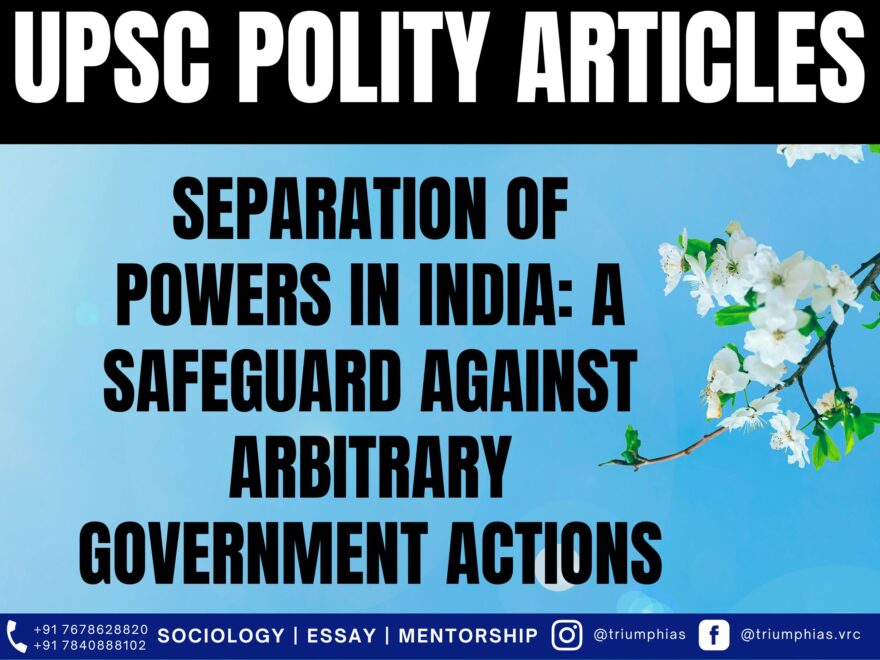Separation of Powers in India
(Relevant for Polity Section of General Studies Paper Prelims/Mains)

Separation of Powers
The notion of the separation of powers was initially introduced by the French philosopher Montesquieu in his work, “The Spirit of the Laws,” which was published in 1748. He contended that the authority of the government should be distributed across three branches: the legislative, executive, and judicial. This concept was envisioned to thwart any single branch from accruing excessive power and to guarantee the government’s answerability to the populace.
- The Constitution of India, which took effect in 1950, delineates the framework for the separation of powers in India under Article 50. It distributes government authority across three branches: the legislative, executive, and judicial. Here’s how they function:
- Legislative Branch: This branch is responsible for crafting laws.
- Executive Branch: Its role is to execute laws and policies.
- Judicial Branch: This branch interprets laws and resolves disputes.
- The constitutional provisions supporting this separation are as follows:
- Article 121: This article emphasizes the separation between the legislature and the judiciary. It prohibits discussions in the legislature regarding the conduct of judges in the discharge of their duties. This ensures that the legislature doesn’t interfere with the judiciary’s work, allowing it to function independently.
- Article 74: Article 74 outlines the separation of powers between the executive and the legislature. It establishes a Council of Ministers led by the Prime Minister to aid and advise the President, who must act in accordance with this advice when exercising their functions. In practice, this means that the executive, headed by the Prime Minister, implements government laws and policies, while the legislature, consisting of the President, elected parliamentarians, and the Council of Ministers, formulates these laws.
- However, it’s important to note that the separation of powers in India is not absolute. There is some degree of overlap and interdependence among the branches:
- The executive branch can suggest new laws to the legislative branch.
- The judicial branch can review the actions of the executive and legislative branches to ensure they align with the Constitution.
- Despite the separation of powers, one drawback of the Indian government system is the interconnectedness between the legislature and the executive.
The doctrine of separation of powers reduces the possibility of arbitrary actions by the government:
- Ensures Checks and Balances: The separation of powers establishes a system of checks and balances in which each branch of government possesses the authority to restrain the actions of the others. For instance, the judiciary has the capacity to scrutinize and invalidate unconstitutional laws, thereby preventing the legislature from enacting arbitrary legislation.
- Promotes Accountability: Every branch of government is answerable to distinct entities or institutions. The executive is accountable to the legislature, the legislature is accountable to the electorate, and the judiciary is accountable to the Constitution. This arrangement guarantees that each branch remains answerable for its conduct and deters arbitrary government actions.
- Preserves Judicial Independence: The autonomy of the judiciary assumes a critical role in preventing arbitrary governmental actions. It serves as a check on the activities of the other governmental branches, ensuring that the government adheres to the confines of the Constitution.
- Kesavananda Bharati v. Union of India (1973): In this landmark case, the Supreme Court ruled that Parliament’s authority to amend the Constitution is not unrestricted and cannot be employed to dismantle its fundamental structure. This judgment established the doctrine of the Constitution’s fundamental structure, limiting the government’s ability to modify the Constitution and prevent arbitrary actions.
- R. Bommai v. Union of India (1994): In this case, the Supreme Court determined that the President’s authority to dismiss a state government is not unbounded and can only be exercised based on information provided by the Governor. This ruling introduced the Governor’s report principle, which confines the government’s ability to dismiss a state government and safeguards against arbitrary actions.
The separation of powers creates a system of checks and balances, where each branch of government has the power to limit the actions of the other branches, and ensures that each branch is held accountable for its actions. The examples given above illustrate the importance of the doctrine of separation of powers in reducing the possibility of arbitrary actions by the government in India.
Sample Question for UPSC Sociology Optional Paper:
1. Question: How does the Constitution of India establish the framework for the separation of powers?
Answer:
The Constitution of India, under Article 50, delineates the separation of powers by distributing authority across the legislative, executive, and judicial branches.
2. Question: What is the significance of Article 121 in ensuring the independence of the judiciary?
Answer:
Article 121 emphasizes the separation between the legislature and the judiciary by prohibiting discussions in the legislature regarding the conduct of judges, ensuring the judiciary’s independence.
3. Question: Is the separation of powers in India absolute?
Answer:
No, the separation of powers in India is not absolute. There is a degree of overlap and interdependence among the branches.
4. Question: How does the doctrine of separation of powers ensure checks and balances within the Indian government system?
Answer:
The doctrine establishes a system where each branch has the authority to restrain the actions of the others, promoting accountability and deterring arbitrary actions.
5. Question: What impact did the Kesavananda Bharati case have on the doctrine of separation of powers in India?
Answer:
The Kesavananda Bharati case established the doctrine of the Constitution’s fundamental structure, limiting the government’s ability to amend the Constitution and thereby preventing arbitrary actions.
To master these intricacies and fare well in the Sociology Optional Syllabus, aspiring sociologists might benefit from guidance by the Best Sociology Optional Teacher and participation in the Best Sociology Optional Coaching. These avenues provide comprehensive assistance, ensuring a solid understanding of sociology’s diverse methodologies and techniques.
Separation of Powers, Indian Constitution, Article 50, Article 121, Article 74, Legislative Branch, Executive Branch, Judicial Branch, Checks and Balances, Kesavananda Bharati, S. R. Bommai, Accountability, Arbitrary Actions, Separation of Powers, Indian Constitution, Article 50, Article 121, Article 74, Legislative Branch, Executive Branch, Judicial Branch, Checks and Balances, Kesavananda Bharati, S. R. Bommai, Accountability, Arbitrary Actions

Choose The Best Sociology Optional Teacher for IAS Preparation?
At the beginning of the journey for Civil Services Examination preparation, many students face a pivotal decision – selecting their optional subject. Questions such as “which optional subject is the best?” and “which optional subject is the most scoring?” frequently come to mind. Choosing the right optional subject, like choosing the best sociology optional teacher, is a subjective yet vital step that requires a thoughtful decision based on facts. A misstep in this crucial decision can indeed prove disastrous.
Ever since the exam pattern was revamped in 2013, the UPSC has eliminated the need for a second optional subject. Now, candidates have to choose only one optional subject for the UPSC Mains, which has two papers of 250 marks each. One of the compelling choices for many has been the sociology optional. However, it’s strongly advised to decide on your optional subject for mains well ahead of time to get sufficient time to complete the syllabus. After all, most students score similarly in General Studies Papers; it’s the score in the optional subject & essay that contributes significantly to the final selection.
“A sound strategy does not rely solely on the popular
Opinion of toppers or famous YouTubers cum teachers.”
It requires understanding one’s ability, interest, and the relevance of the subject, not just for the exam but also for life in general. Hence, when selecting the best sociology teacher, one must consider the usefulness of sociology optional coaching in General Studies, Essay, and Personality Test.
The choice of the optional subject should be based on objective criteria, such as the nature, scope, and size of the syllabus, uniformity and stability in the question pattern, relevance of the syllabic content in daily life in society, and the availability of study material and guidance. For example, choosing the best sociology optional coaching can ensure access to top-quality study materials and experienced teachers. Always remember, the approach of the UPSC optional subject differs from your academic studies of subjects. Therefore, before settling for sociology optional, you need to analyze the syllabus, previous years’ pattern, subject requirements (be it ideal, visionary, numerical, conceptual theoretical), and your comfort level with the subject.
This decision marks a critical point in your UPSC – CSE journey, potentially determining your success in a career in IAS/Civil Services. Therefore, it’s crucial to choose wisely, whether it’s the optional subject or the best sociology optional teacher. Always base your decision on accurate facts, and never let your emotional biases guide your choices. After all, the search for the best sociology optional coaching is about finding the perfect fit for your unique academic needs and aspirations.
To master these intricacies and fare well in the Sociology Optional Syllabus, aspiring sociologists might benefit from guidance by the Best Sociology Optional Teacher and participation in the Best Sociology Optional Coaching. These avenues provide comprehensive assistance, ensuring a solid understanding of sociology’s diverse methodologies and techniques. Sociology, Social theory, Best Sociology Optional Teacher, Best Sociology Optional Coaching, Sociology Optional Syllabus.
Best Sociology Optional Teacher, Sociology Syllabus, Sociology Optional, Sociology Optional Coaching, Best Sociology Optional Coaching, Best Sociology Teacher, Sociology Course, Sociology Teacher, Sociology Foundation, Sociology Foundation Course, Sociology Optional UPSC, Sociology for IAS,
Follow us :
🔎 https://www.instagram.com/triumphias
🔎https://www.youtube.com/c/TriumphIAS
https://t.me/VikashRanjanSociology
Find More Blogs
|
Scope of the subject and comparison with other social sciences |
|||
|
|
|
|
Modernity and social changes in Europe |

